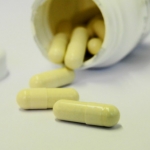While some side effects such as nausea, dizziness, and headaches associated with selective serotonin reuptake inhibitor (SSRI) antidepressants tend to decrease or resolve over time, other side effects such as sexual dysfunction rarely remit spontaneously. Treatment of sexual side effects in women is especially important when about 30-70% of patients taking antidepressants may experience sexual side effects, combined with the fact that women are prescribed antidepressants at rates of 2 to 1 when compared to men.
Sexual side effects in women may entail decreased sexual desire, difficulty with orgasm, genital sensitivity, reduced sexual activity, pain with sexual intercourse, decreased vaginal lubrication, and dissatisfaction or loss of pleasure from sexual activity.
Sildenafil, marketed under the name Viagra, is a selective phosphodiesterase type 5 inhibitor approved for the treatment of erectile dysfunction in men, and has received study for men with depression and erectile dysfunction associated with SSRI treatment. In women, initial trials using selective phosphodiesterase inhibitors looking at both premenopausal and postmenopausal women did not show significant improvements for sexual arousal disorder; however, later randomized controlled trials supported their use for the improved frequency of sexual intercourse, arousal, orgasm, and satisfaction.
In a study by Nurnberg et al. conducted over 7 outpatient medical centers, 98 premenopausal women with remitted depression on SSRI antidepressants, ages 18-50 years old, were enrolled into an 8 week prospective, parallel- group, randomized, double blind, placebo controlled clinical trial. This study used the Clinical Global Impression sexual function scale as a primary measure, and also utilized the Female Sexual Function Questionnaire, the Arizona Sexual Experience Scale-female version, and the University of New Mexico Sexual Function Inventory- female version, a sexual activity event log, and the Hamilton Depression Rating Scale.
This study showed that doses of sildenafil between 50mg-100mg, with the mean study dose of 91.7 mg, lead to an improvements in sexual side effects in the treatment group compared to the placebo control group. 28% of women taking sildenafil reported no improvement with the treatment, while 73% of women taking placebo reported no improvement. There was no statistical difference in the baseline and end-of-study Hamilton depression scores. While there were no baseline endocrine value differences between the two groups, participants with higher levels of testosterone and thyroxin were more likely to experience improvement in sexual function, regardless of the assigned treatment group. Headache, flushing, dyspepsia, nasal congestion, and transient visual disturbances were the most common adverse events reported with sildenafil use in this study; nausea and increased anxiety were more commonly reported in the placebo group than the study group.
This is the first randomized placebo-controlled study to show a significant decrease in sexual side effects when looking at the use of sildenafil in premenopausal women with SSRI-associated sexual dysfunction, supporting previous case reports and open label studies of this medication in this population.
Betty Wang, MD
Nurnberg HG, Hensley PL, Heiman JR, Croft HA, Debattista C, Paine S. Sildenafil Treatment of Women with Antidepressant-Associated Sexual Dysfunction. JAMA. 2008 Jul 23;300(4):395-404.







Leave A Comment